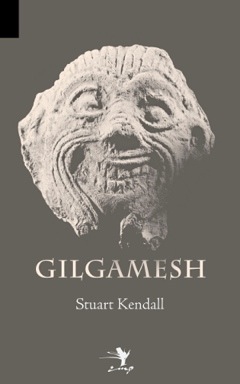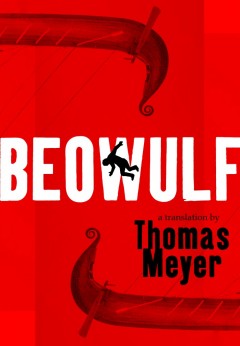Robert Kelly on New Gilgamesh & Beowulf Translations
TENSIONS
Robert Kelly
A note on two newly published translations I’m anxious to let the world know about:
Stuart Kendall, Gilgamesh. New York, Contra Mundum, 2012
Thomas Meyer, Beowulf, a translation. Brooklyn, Punctum Books, 2012.
Where does the tension come from that runs the poem?
What’s missing in almost all translations of the old stuff (the classics, the canon, that fleet of inscrutable foreign vessels lined up, sailing in against our ignorance) is tension. Tension means stretching, pulling the fabric taut, making the hearer (reader) hold the breath.
Scholars are mostly not good at holding anybody’s breath. (I think of a few exceptions—Magoun’s Kalevala, Tedlock’s Popol Vuh, Arrowsmith’s Petronius) but they are indeed exceptions.
But here come two grand triumphs of poetry bringing old instances of itself to new life. Simply said, a good translation of a poem must be itself a good poem.
Stuart Kendall’s new translation of the Gilgamesh tablets, Thomas Meyer’s newly published but decades-old translation of the Beowulf manuscript—these are our ancestral narratives: one of the whole western world, one of our own Northern Paranoid Lifestyle culture, whose languages we still are.
All great epics are always about slaying the monster. And here Beowulf and Gilgamesh in a strange way seem almost to be the same story. Hero vs Monster. But Gilgamesh starts out as a tyrant, wielding thigh-right over all the brides and youths of the City. The City complains to the gods, who tame him by love—they send him a companion, the Dutiful Young Man, his Enkidu, someone to fight alongside him, to cherish. Love unhinges tyranny. Beowulf begins alone and ends alone. He is the individual, the solitary hero, who acts alone. Already we’re in the unlikely world, however furry, of Kafka and Camus, the hero defined by his relation to his society, by his free action within its necessities. The hero nurses his difference; his difference empowers his moral superiority to others. What children heroes seem to us, children with swords.
These are primal narrations, and need careful enactment in our stale new languages. To feel their energies, to cherish their differences.
A translation has to make love with the text. But not to it — the translator is not a suave lothario, touching every text with the same practiced strokes. No, the translator must meet each text humble to its difference. Humble, but horny.
Kendall and Meyer know how to coax their poems to speak so we can hear. Looking at a page of Meyer’s Beowulf I get excited, something’s happening here with the space of language which is (forgive me, it has to be said) the space of time
Stuart Kendall works time in a physical way — takes the ancient tablets and breaks them into pages, pages that shatter the ongoing narrative into (instead) confrontative moments. So that looking at a given page of text (in the strikingly handsome Contra Mundum edition) has the feel of picking up a fragment of the cuneiform tablet, miraculously lucid, magically set in order so the reader can follow the story. The solemn priestly tablets of the “original” (don’t ask) are transformed into communiqués from the field of action: the page.
The page is the field. The page is spacetime itself, your moment. The page (since Gutenberg) has been the only time there is.
That’s what these two exemplary translations –nothing like each other except in the profound ground of modern poetics from which they upwell– have in common: the page as unit of imposition, golden tablet of their revelations.
God forgive us, we read Beowulf as if it were a story, that shabby thing, rather than the glorious exposition of linguistic transformation–kennings, alliterations, howl of vowel sequences, thunder of shifting stresses. The story is just there to pin language on: language that sustains us by transforming, lightning-quick, the consensual world from which language arises, possible words making impossible things.
Usually when you read a translation of an ancient text, you wind up quietly (furtively often) wondering what all the fuss is about. A city besieged, a grumpy hero, a monster slain? All that Stalinist architecture, heroes, peoples, plots, so effing what? It was the language that worked for the hearers, the Original Hearers, the ones for whom they spoke and memorized and wrote–they memorized the words themselves because the words are what counted. The words are what shaped time, shaped the hearers’ time.
The time of hearing. Warriors, merchants, weavers, tillers —weary after a day’s work, listening to a storyteller. What counted was not the story but the telling. The telling is everything. The caress, the tenderness, the aggression of the words as they poured forth, unstoppably, they gave the listeners the experience they craved. Do you think they really, as they listened, always kept straight which was Glaucus, which Diomedes? Modern translations need to recover the time of listening.
That’s what seems to me to happen in the translations I’m looking at.
So the story is an armature to weave words on–whose flesh will be the tilth and nourishment of the act of hearing, reading.
Noteworthy that we understand or accept this meat most readily in works that present themselves as writing in ‘dialect’ — Flann O’Brien, Junot Diaz, Amos Tutuola–where it’s perfectly clear we’re reading for the language, the shimmer it gives to the experenced time that is the actual nature of literature.
Now poets find their way to the old texts and summon _something in them_ into new life. The spur to shape sound. The story that agitates the breath of the teller till the hearer shares it, the angst, the squeeze of tension. Tension.
By chopping sentences into lines, staggering them down the page, not letting the sentence rest, Kendall keeps us going, each page a reward and a challenge to go on. It’s wonderfully unsettling—where are the nice smooth continuous paragraphs of (say) N.K.Sandars’ moving and legible translation of the Epic (note the literary claim) of Gilgamesh? Instead we get Kendall’s dramatically urgent starting and stopping like a man in rage, his timeless pauses, his insistence on bringing us at every moment into the hero’s moment. Emotion is a gate we can’t walk around, we have to go through. Kendall can make us feel the baffled stammer of a hero unsure of what to cry out next. His method is frictional, making the reader react tablet by tablet, ever thrown back into the story. Ability to react to stimuli is the universal property of, surest sign of, life.
Meyer uses the page differently. Each page is a composed poem or prosem in itself, each in its own ‘form’ or shape. It’s as if the poem is a cycle of small poems that summate to epic. Long lines, short lines, space and hurried prose-like statements enact the fabled sense of ‘measure’ with which American poetry came to new life (via Pound and Williams and their heirs). There is a dazzling proficiency of music in Meyer’s own work, and here he sings fresh from his deconstructed original—a poem broken into its music.
So you can’t have the story without the language.
There is no story without the language.
Without the language we’d have only dreams and nightmares, monsters and wars.



 Poasis II: Selected Poems 2000-2024
Poasis II: Selected Poems 2000-2024 “Todesguge/Deathfugue”
“Todesguge/Deathfugue” “Interglacial Narrows (Poems 1915-2021)”
“Interglacial Narrows (Poems 1915-2021)” “Always the Many, Never the One: Conversations In-between, with Florent Toniello”
“Always the Many, Never the One: Conversations In-between, with Florent Toniello” “Conversations in the Pyrenees”
“Conversations in the Pyrenees” “A Voice Full of Cities: The Collected Essays of Robert Kelly.” Edited by Pierre Joris & Peter Cockelbergh
“A Voice Full of Cities: The Collected Essays of Robert Kelly.” Edited by Pierre Joris & Peter Cockelbergh “An American Suite” (Poems) —Inpatient Press
“An American Suite” (Poems) —Inpatient Press “Arabia (not so) Deserta” : Essays on Maghrebi & Mashreqi Writing & Culture
“Arabia (not so) Deserta” : Essays on Maghrebi & Mashreqi Writing & Culture “Barzakh” (Poems 2000-2012)
“Barzakh” (Poems 2000-2012) “Fox-trails, -tales & -trots”
“Fox-trails, -tales & -trots” “The Agony of I.B.” — A play. Editions PHI & TNL 2016
“The Agony of I.B.” — A play. Editions PHI & TNL 2016 “The Book of U / Le livre des cormorans”
“The Book of U / Le livre des cormorans” “Memory Rose Into Threshold Speech: The Collected Earlier Poetry of Paul Celan”
“Memory Rose Into Threshold Speech: The Collected Earlier Poetry of Paul Celan” “Paul Celan, Microliths They Are, Little Stones”
“Paul Celan, Microliths They Are, Little Stones” “Paul Celan: Breathturn into Timestead-The Collected Later Poetry.” Translated & with commentary by Pierre Joris. Farrar, Straus & Giroux
“Paul Celan: Breathturn into Timestead-The Collected Later Poetry.” Translated & with commentary by Pierre Joris. Farrar, Straus & Giroux
You are so worth reading every morning. You write beautifully and often, as today, wake up a few of my long asleep brain cells. Ah Beowulf! As I am sure I told you so many years ago, I wrote my best university paper on Beowulf. I should dig it out. I somehow find, in boxes from time to time, the strangest of things, while important , personal stuff, has long ago been lost in too many relationships and way too many moves. My stuff is out there, somewhere. Maybe some of it will call. I’m here. Unlike some, I have been too much of a pack up and go sort of a lad. Old age has altered that some. I have put down roots like a tree and, if you can tolerate a mixed metaphor, I also hibernate like a bear. Maybe my ‘bear’ is up a tree! Anyhoo, I recall the prof writing a favorable comparison to Tolkien’s ‘The Monsters and the Critics.’ I called mine ‘The Existential Beowulf.’ Okay,so he liked me. I remember having 2 translations at the time which for young me was exhaustive research though, in fairness, I had oceans of ‘Existentlialist’ literature having discovered the joys in high school. I found one of the Beowulf translations, by Burton Raffel, just a second ago. It cost .95 cents back then! I have too large a stack of the ‘Unread’ to promise reading it anytime soon. I am somehow warmed by the knowledge that I still have it. One day I will dig for the paper. Maybe not. Thanks anyway for the pleasant memory this rainy a.m.
Ah, Poo — this morning the writing was by Robert Kelly — he wrote the review of two books I’ve wanted to write about but hadn’t gotten to yet.
You should be flattered. I thought he was you. By the way, you’re both good!